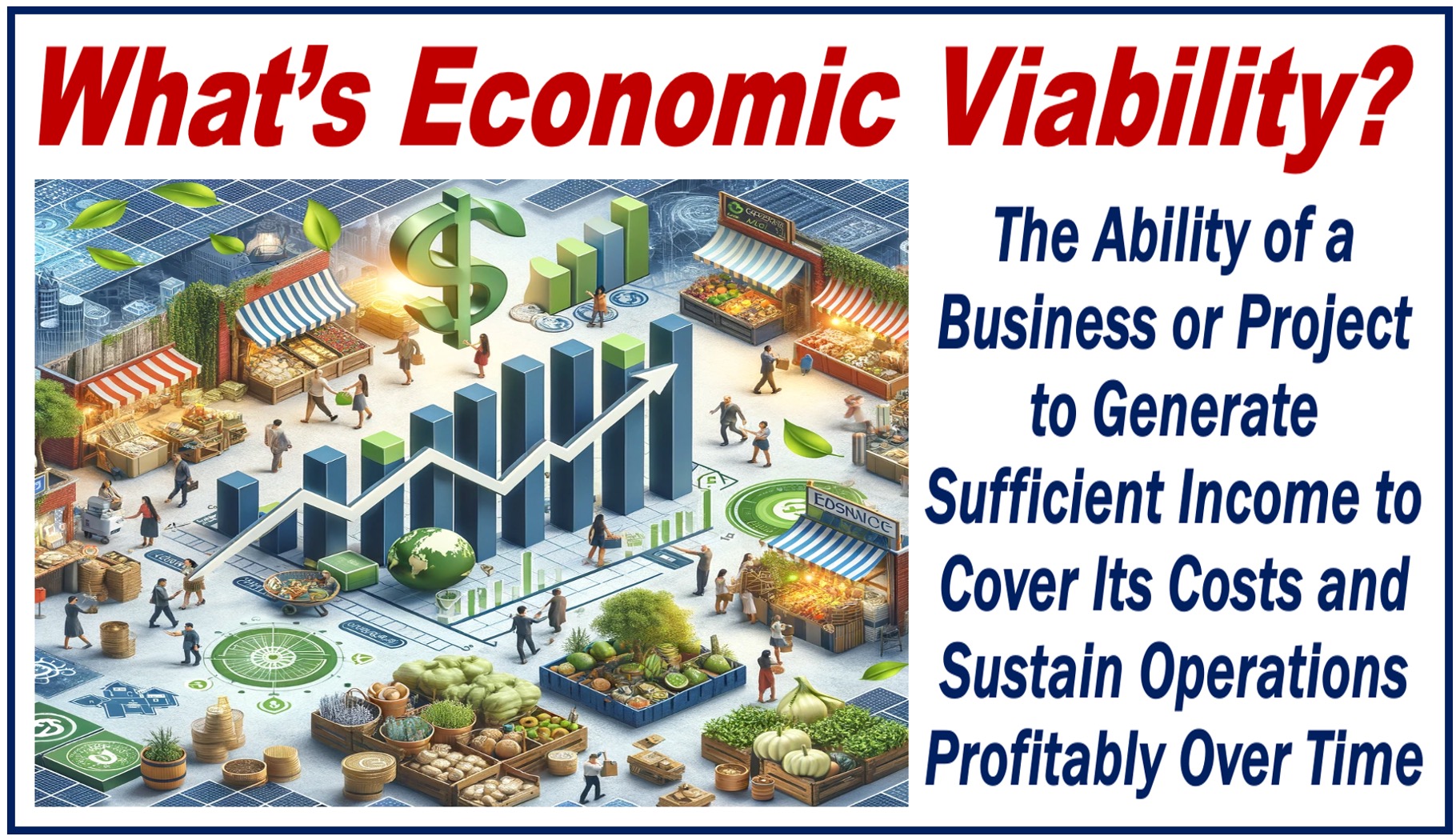If you are wondering whether an idea, venture, or project can support itself financially or commercially over the long term, you are wondering about its Economic Viability, also known as Commercial Viability.
Economic viability is a question we ask about businesses, projects, ideas, or even whole economic systems. When we use the term, we are asking: “Can it become profitable, self-sustaining, self-supporting, or financially viable?”
If something has economic viability, it is economically viable. “Viability” is a noun, “viable” is an adjective, “economic” is an adjective, and “economically” is an adverb.
If you have an economically viable project, it brings in enough money through sales or operations to cover all of its costs. These costs include everything, such as salaries, buying materials, paying rent, utilities, maintenance and repairs, insurance premiums, marketing and advertising, and other operational expenses.
If a venture is economically viable, it ideally has some extra funds left over, called profit, that we can reinvest for growth or pay out to owners as a return on their investment.
The Cambridge Dictionary has this definition of “Commercial Viability,” plus an example sentence containing the term:
“The ability of a business, product, or service to compete effectively and to make a profit. Example Sentence: ‘Wind power owes some of its rising commercial viability to government support.'”
Economic Viability Matters
Commercial viability is important for several reasons:
-
For businesses
If a business is unable to make a profit, it will eventually run out of funds. This means that it will have to shut down, leading to job losses and wasted resources.
-
For projects
All projects, regardless of who built them – governments or businesses – need funds to exist. If a project won’t pay for itself, it is a drain on somebody’s budget.
Businesspeople, lawmakers, and other decision-makers need to know whether a project is worthwhile – economically viable – before they spend time and money on it.
-
For investors
People and companies who invest their money want to see a return. Nobody will support a business or project that does not demonstrate potential for future profitability.

How Do We Determine Commercial Viability?
There are several tools and methods we can use to determine whether something is economically viable:
- Financial Projections
These are financial forecasts about how much income a project or business will generate, and what its expenses are likely to be.
- Cost-Benefit Analysis
A deeper evaluation that takes into account all the costs and benefits of a project, not just the direct financial ones.
For example, a new affordable housing project might reduce crime, which is a valuable benefit even though it doesn’t earn money directly.
- Market Research
In the world of business, gaining a better understanding of the market, likely competitors, customer tastes and preferences, distribution channels, market trends, the regulatory environment, and how much consumers will pay for something is essential to understanding a project’s viability.
Beyond Money: Other Aspects of Viability
Money is not the only factor that matters when considering economic viability. Long-term success also depends on:
-
Environmental Sustainability
If you have a project or business that damages the environment, you may eventually face fines or have to find more expensive ways to operate, which may undermine its viability.
-
Social Responsibility
Communities and consumers today increasingly expect projects and businesses to contribute positively to society. This factor may determine their long-term success.
-
Technological Adaptability
A project’s or business’s ability to adapt to technological changes can be crucial. If your business fails to keep up with technological advancements, you may fall behind and struggle to survive in today’s fiercely competitive marketplace.
-
Legal and Regulatory Compliance
Adhering to laws and regulations is essential. Non-compliance can lead to legal issues, hefty fines, operational shutdowns, and other penalties, all of which can severely undermine economic viability.
Final Thoughts
Economic viability is the foundation for successful and sustainable ventures. It requires careful planning, an honest assessment, and a broader view that goes beyond just the short-term balance sheet.
